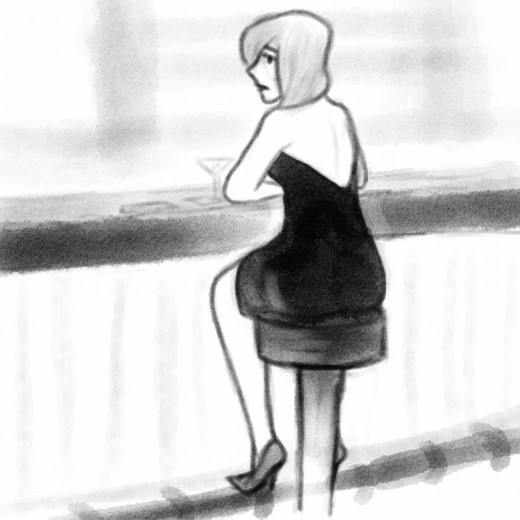As far as indie games go, Ninja Pizza Girl has been on my radar for a while. I saw a video with the creators a while back and it seemed quirky, in a fun sort of way. The idea of an entire family starting their own indie development house is cute, especially with the father’s daughters pitching in to help with story and art. So when Polygon had an op-ed from the creator about the game, I took notice.
The crux of it is Jason Stark, the head of Disparity Games, relating precisely how and why Ninja Pizza Girl came to be. He talks about how the concept came straight from his childrens’ mouths but more importantly he also describes the stumbles in his own assumptions about not only game design but also about his daughters’ growing vulnerability as they move into teen-hood and beyond. It was a bit of insight that I found intriguing, not so much as a gamer, but rather as a woman. It’s incredibly commonplace that men in the world, even ones closest to us, do not realize that women have these hidden narratives that they’ve never stopped to consider. It never occurs to them that our lives are in any way unique or different from theirs. The idea of relating this back to game design and story development is a smart one. Video games are one of the avenues of interactive media that could do so much better at peeking into the kinds of stories women navigate and centralizing them as important. We’ve seen so much discussion lately about the lack of women protagonists in games as well as a lack of women in the game industry. Allowing more women to be game creators as well as seeing ourselves represented not only reinforces the notion that we are human to the world, but lifts the veil on how our experiences might differ.
It is in this vein that I welcome Ninja Pizza Girl into the world - I believe that teen girls are one of the pockets of womanhood most needing of stories to be told (though I still feel the market is only making baby steps and still trends towards white, affluent and the like). It’s the father’s own admission of fault in taking his wife and children for granted and not listening enough that reminds me of the interview that we did on Justice Points with Fullbright Company’s Steve Gaynor and Karla Zimonja. Steve said that one of the things he took the most care to do when crafting Gone Home‘s narrative was interviewing queer women about being teens, as it was not something he had personal experience with. Jason not taking this tactic from the start is something he admits fault to and through the course of the article, outlines his own steps to rectify this. This is good - men realizing that they need to listen to the women in their lives in order to actually understand them.
It was this listening that informed Jason’s decision to turn the enemy of the story from rival pizza ninjas that you kill to something far scarier - other teens working for a pizza corporation that would tease and humiliate you. The bullying and how you deal with it is what determines how much of the game you spend in a more gray, colorless world of your own depression or in a world full of joy and brighter hues. I find this mechanic, as well as some of the ways the game rewards you for handling it (running away is definitely an option) really interesting. As someone who was very viciously bullied from middle school onward, the idea of centering a game around bullying as not only a narrative struggle but a combat mechanic seems a very unexplored but necessary “hook.” What really woke me up to the fact that being a teen girl now was significantly different than my experience was the mention of the protagonist, Gemma, having to fend off bullies phone-cam recording one of her ultimate embarrassing moments. The cultural touchstone of recording video with your phone is not lost on me, but it shook me out of my own reminiscing. I never, ever had to deal with other people, people who were seeking to hurt me, recording things without my knowledge and distributing them to a very, very large audience. With the recent news of Jada and looking back to something like Steubenville, it’s on my mind that teen girls being brutalized is aided and immortalized by the advent of digital technology. It was literally not something I had to deal with when I was a teen. It feels like more so now than ever, we need to start seeing young women as people and less as props for tormenting.
It was these types of things, along with the story of a parent humiliating a teen girl to suicide on Facebook, that hung around my head as I read. I was wondering if Stark would talk about mens’ role in being both abusers and harassers to teen girls, especially given the opening anecdote, but it never came. It seems the idea of bullies in the game (as well as the article) stops at a generic “other teens” but specifically mentions his own daughters dealing with the politics of other teen girls. This quote specifically jumped out at me:
Little girls start learning psychological games at the age of eight and master them by the age of fifteen.
It specifically refers to his youngest daughter losing some of her female friends due to internal politics, something I think a lot of us can relate to, but Jason lacking an understanding that many of us have now. It was this quote in particular that made me somewhat skeptical of his ability to grasp the subject matter that he was building his game upon. While he may recognize that the things his daughters are going through actually happen, the larger context for them is missing. It’s a pretty common narrative that women are intensely catty, psychological torturers and “girl bullying” is a phrase I’ve oft heard over the years. With the aid of the Internet, there’s been a lot of scare stories about a bunch of girls smearing the reputation of another girl for some real or imagined slight. What I never heard was recognition of is why this stuff happens; to truly understand why girls bullying each other, you have to admit that sexism is real and is internalized in women from a very early age. When girls hit puberty, we suck the light out of them. They lose enthusiasm for math, science and just about anything else. They have the world’s sexual expectations thrust upon them without being asked if they want it or understand it. Girls become increasingly hostile and political among each other but it’s for reasons that Stark didn’t note, which implied a well-worn narrative. Girls tear each other down due to internalizing the messages that we as a society tell them every day from the moment we decide they are girls: that they suck. Not only that, but that every other girl is an enemy because there is a valuable and finite resource called “men’s attention.” We reinforce notions that women are catty, will steal your “man” and cause you not to trust them. We teach them to be docile, to not speak up and that their problems aren’t worth hearing about, let alone resolving in a straightforward or assertive manner. We break them apart because it keeps them compliant and without a support network.
All of these things are why, despite chipping into Ninja Pizza Girl‘s funding, I will be keeping a close eye on how the game will play. Because for all of the things I think it could do right, Jason Stark’s good intentions but ultimate lack of experience with the narrative of growing up as a girl still will be lingering there. I don’t think ill of him for this, but it makes me wonder how this could have been done by someone who had to jump and fly away from her own bullies way back when.


